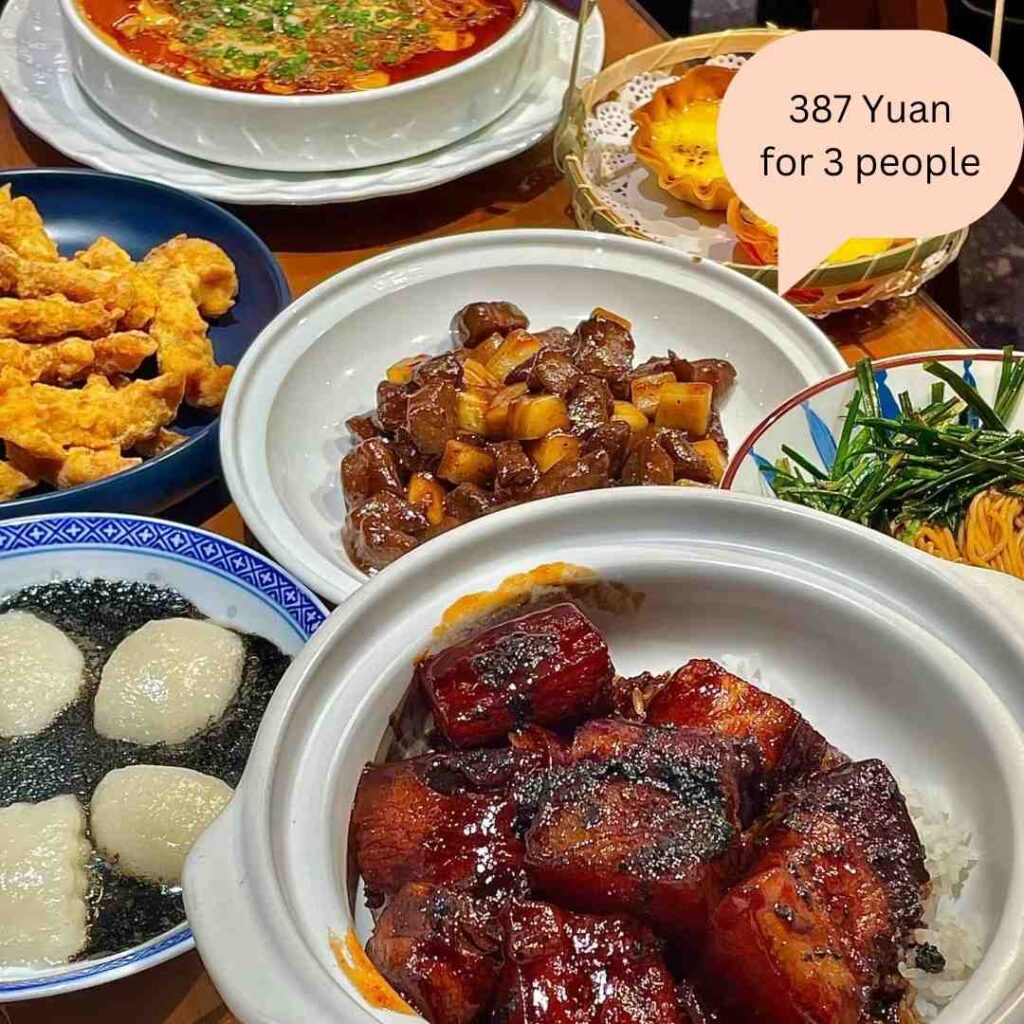Food and living in the city
The standards of living in China are proportional to income and the city you are living in, with a disposable income of 20,000 RMB per month allowing for a comfortable lifestyle. Shanghai offers excellent public transport, a variety of food options, and a range of housing options. Cities like Shanghai being pricier for expats.
Safety, local activities, and food have been some of the few positives of living in China, particularly, Shanghai.
Trying local food and exploring the city center, particularly Xi’an, Chengdu, Shanghai, and Guangzhou, for its culinary delights, can be an exciting adventure for foreign nationals moving to China. Just imagine how many expats have embraced the city’s gastronomic scene, offering a wealth of recommendations and camaraderie in their culinary exploration.

However, the city’s weather, limited internet access, and air pollution have been a few of the drawbacks. Despite these challenges, the public healthcare system is satisfactory, especially for younger individuals.
A few essential tips: Ensure to learn the basics of the Chinese language to navigate daily life more easily. Acquiring health insurance is essential to access the healthcare system effectively. Obtain the necessary work visa and register with the Chinese authorities at the local police station upon arrival. Familiarize yourself with the laws and regulations of the People’s Republic to ensure a smooth transition.
The convenience of living in China is attributed to the efficient public transportation system, affordable taxi services, and the extensive food and goods delivery network, providing ease of ordering goods from local e-commerce sites. Living in and moving to China can be a positive and fulfilling experience.
Employment
Particularly, in terms of employment, obtaining a Z visa or even a business visa is essential for foreigners seeking to work in China. Studying in China is not seen as a problem, but those with a resident permit often face challenges finding employment, especially if they are expats moving from Western countries. Chinese companies rarely hire foreigners, except for roles such as English teachers in Chinese universities or international schools.
Youth unemployment, the need to master the Chinese language and overcome the language barrier, and the limited job opportunities, makes teaching English to Chinese students being the most realistic option as there is a demand for individuals who can speak English fluently, although the process of obtaining an employment license and work permit can be complex and time-consuming.
Finding a job in a Chinese company where English is preferred is more feasible. However, the job market is tough, particularly in sensitive industries. The local language proficiency is also a factor. The best chance for employment is through internal transfers within companies with branches in China, facilitating the job offer process for expats moving to China.
The use of technology
It is recommended to get a VPN for smooth internet access. Apple TV works in China, but accessing books might require a VPN. Both Android and Apple phones function well, with different apps performing better on different platforms.
A good VPN allows streaming services like Netflix and Apple TV. Using a cast device for viewing content on larger screens.

Dual sim phones or eSim cards are recommended for maintaining both home and Chinese numbers.
Carrying a charger and spare battery pack due to the heavy use of phone for translation and other apps. Baidu Translate and DiDi apps are recommended for translation and transportation respectively, and Alipay and WeChat for payments that can be connected to your foreign bank account.
For expats moving to China from most Western countries, it’s advisable to transfer money to a bank account in China and obtain a bank card that allows easy access to funds.
When traveling within the country, purchasing train tickets can often be done at a low cost, especially if booked in advance.
Cultural differences and language barriers
Moving to China as a non-Mandarin speaking foreigner can be challenging. Assimilation is difficult as the culture of Chinese citizens is vastly different from the West. Learning Mandarin is advised as it is the official language and most Chinese people do not speak fluent English.

It’s suggested to do a cultural or language transfer through an educational institution, as working or staying longer than a tourist visa allows can be difficult without a job or degree.
Learn to write and say your address in Chinese characters and keep a written copy of it along with some cash in case your phone dies. Additionally, navigating daily life in the capital city can be easier with basic language skills and access to a Chinese version of essential information.
Visa
Before you apply for a Chinese visa to enter China, it’s important to understand the local culture and customs. These cities attract a significant number of expatriates, so you’re likely to find a community of fellow foreigners to connect with.
However, keep in mind that becoming a Chinese citizen involves a complex process and is generally not feasible for expatriates.
Moving to China requires careful planning and a valid reason, such as a job, due to strict visa restrictions of the Chinese government. Visa application processes can differ based on the purpose of travel, with options including student visa (such as X visa), work visa (such as Z visa), business visa (such as M visa), and residence permit. Acquiring the appropriate Chinese visa and residence permit is crucial for a smooth transition and legal stay in the country.
It’s essential to ensure that the right visa is obtained to avoid legal issues, which may involve navigating through the Public Security Bureau regulations.
For those seeking permanent residence or Chinese citizenship, additional steps beyond visa applications are necessary, which might involve coordination with the Chinese embassy and compliance with specific green card requirements. Additionally, consider the visa needs of your family members if they plan to accompany you to China.

Bottom line
Expats are scarce outside major cities like Beijing, Shanghai, Guangzhou, and Shenzhen. Despite challenges, the experience of moving to China can be rewarding, albeit accompanied by potential culture shock. Big cities like these offer a vibrant city center and serve as hubs for expats seeking a new life immersed in Chinese culture.
